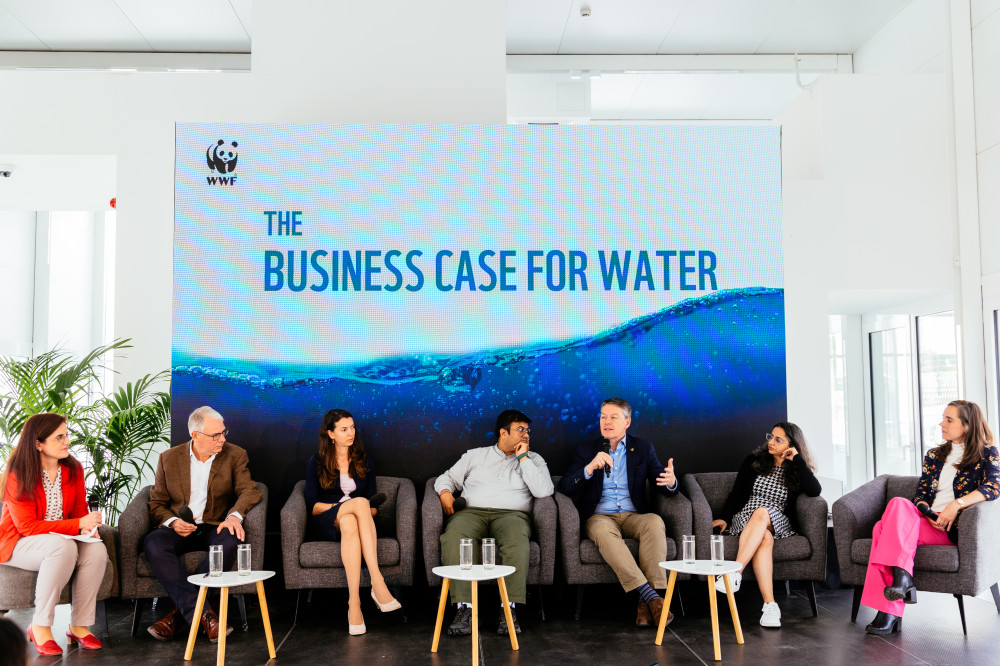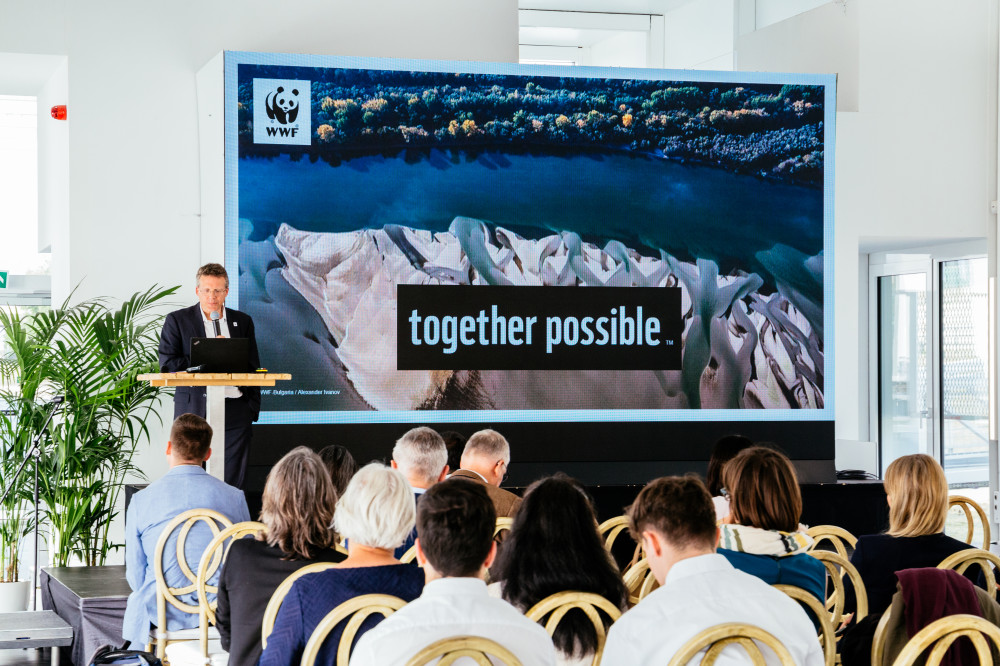
© Photo credit: Laura Szekeres for WWF-CEE. On the picture from left to the right: Fatima Bertrán de Lís, Senior consultant, denkstatt Austria; Jan Burger, Climate and Water Sustainability Director, Coca-Cola Europe; Katrin Tomova, Senior consultant sustainability, denkstatt Bulgaria; Harsh Sheth, Senior manager Transformative Partnerships (Freshwater), WWF Sweden; Stuart Orr, Freshwater Practice Lead, WWF International; Neha Madan Asthana, Strategic Topic Leader Water, IKEA; Juliane Vatter, Senior Project Manager Water Stewardship, WWF Germany
WWF draws attention to the need for collective action in the Danube River Basin across sectors for the benefit of people, businesses, and nature
Europe’s water and freshwater ecosystems’ annual economic value is estimated at more than €11 trillion, according to a report published last year by WWF. Yet, in recent centuries, the continent has lost up to 90% of its wetlands, which serve as a natural system against floods and droughts and increase climate resilience. Furthermore, 60% of Europe’s rivers, lakes and other surface water bodies are not in good condition. This progressive decline of freshwater ecosystems is a threat to society, the economy, and the environment.
In response to those alarming trends, the environmental organization WWF Central and Eastern Europe organized a leadership summit for addressing water challenges in the Danube River Basin, named “The Business Case for Water”. Held in Budapest on April 9th, the event gathered business representatives from Hungary, Bulgaria, Romania, Austria, Germany, the United States, Sweden, Czechia, and Spain.
Participants heard how private sector companies and their supply chains all depend, directly and indirectly, on supplies of freshwater. Managing that risk will require companies to take action not only within their own operations and supply chains, but also in cooperation with others through collective action and contributing to the good management of water resources. This will require working with nature rather than against it, e.g. by conserving and restoring floodplains, wetlands, so that they can serve as sponges to hold and slowly release water and re-charge aquifers.
Drawing upon real-life examples and innovative approaches, industry experts presenting at the summit showcased how businesses can integrate sustainable water practices into their operations and supply chains to mitigate risk, enhance resilience, and drive positive environmental outcomes. From transformative partnerships in the food retail supply chain, risk modeling in the textile sector, to natural capital assessment, the participants in the event were able to gain actionable insights on the latest water sustainability practices. The speaker lineup included participants from the WWF network, The International Commission for the Protection of the Danube River (ICPDR), Coca-Cola Europe, IKEA, H&M Group, EDEKA, and denkstatt.
As the climate crisis worsens, severe droughts are devastating European landscapes. According to the European Drought Observatory, more than 60% of land in the European Union and the UK is now affected by drought conditions. In Europe, industry and agriculture are the biggest users of water, amounting to over 70% of the water use together. In this context, the summit provided a platform for engaging discussions, all centered around a joint message:
To ensure water availability for tomorrow, the private sector needs to adopt sustainable practices and invest in healthy freshwater ecosystems today.
Floodplains and wetlands contribute to cleaner, healthier water by acting as natural filters that remove sediment, nutrients, and pollutants. They also store significant amounts of carbon, helping to mitigate climate change. Additionally, by allowing water to infiltrate the soil, they replenish groundwater and offer numerous other environmental benefits. Reconnecting lost floodplains and restoring wetlands or adjusting land use on the upper catchments can mitigate both flood- and drought risks. By allocating funds for floodplains and wetlands restoration, sustainable land use crucial for their ability to enhance both water quality and quantity, businesses can ensure the long-term viability of their operations and help local communities and biodiversity thrive.
Many valuable freshwater habitats have been lost as rivers have been straightened and regulated, side channels cut off, flood protection dykes built, and many floodplains disconnected or drained. At the conference, WWF-CEE presented its decades-long efforts to promote and implement river, floodplain, and wetland restoration in already damaged riverine habitats. The environmental organization advocates for governance frameworks that enable larger-scale restorations and urges key business actors, stakeholders, and authorities to join efforts for restoration and sustainable water resource management and land use.
The event program spotlighted the concept of water stewardship as a vital component of the comprehensive response to the water crisis. As defined by the Alliance for Water Stewardship, water stewardship is the use of water that is socially and culturally equitable, environmentally sustainable and economically beneficial, achieved through a stakeholder-inclusive process that includes both site- and catchment-based actions. Participants learned of the steps toward water stewardship, from initial awareness through internal and collective action.
“Water is a shared resource, it doesn't recognize national or property borders, so we need to work together to protect it," said Andreas Beckmann, WWF-CEE's Regional CEO. Concluding the summit, he issued a compelling call to action to the businesses reliant on the Danube River Basin's ecosystem services. He urged the private sector to take action for safeguarding vital freshwater ecosystems, ensuring the prosperity of people, businesses, and nature alike.
The event was organized as part of the Living Danube Partnership, a long-standing collaboration between WWF-CEE and The Coca-Cola Foundation, promoting the conservation and restoration of wetlands in the Danube basin.

© Photo credit: Laura Szekeres. On the photo: Andreas Beckman, Regional CEO, WWF-CEE
"The bottom line is that businesses must not only accelerate action on water within their own fenceline but also urgently scale up collective action to build more resilient river basins. It's time for companies - both existing water stewardship champions and those firms that have still not woken up to worsening water risks - to rise to the freshwater challenge and invest in Nature-based Solutions to restore healthy rivers because they are central to tackling water risks, adapting to climate change, reversing nature loss and driving sustainable development." – Stuart Orr, Freshwater Practice Lead WWF International
“Water stewardship is a priority for The Coca‑Cola Company because water is essential to life, the communities we operate in, and to our business. The world is experiencing increased water scarcity with demands for safe, usable water exceeding supply in certain areas. With operations nearly everywhere in the world, we have a responsibility to accelerate our efforts to help address water stress, protect local and shared water resources and help build community climate resilience. As WWF says: Together possible. And The Coca-Cola Company adds: for a better shared future.” – Wouter Vermeulen, Vice President Sustainability & Public Policy Europe, Coca-Cola Europe
"Investing in the preservation and restoration of our freshwater ecosystems is not merely an environmental endeavor, it is also a strategic imperative for businesses. The health and good status of our rivers directly impacts on the success and longevity of enterprises across various sectors. From agriculture to manufacturing, from tourism to technology, every industry relies on the availability of water for its operations. Keeping water clean and ensuring environmental integrity shall be equally important for businesses and related cooperation is key. These practices align with the mission of the ICPDR for cleaner, healthier, and safer waters in the Danube Basin for us and future generations." – Birgit Vogel, Executive Secretary at ICPDR
“The health of our freshwater ecosystems is intertwined with the success of businesses worldwide. By investing in nature and sustainable practices, we not only safeguard our environment but also ensure the long-term prosperity of our enterprises and the well-being of communities.” – Neha Madan Asthana, Strategic Topic Leader Water at IKEA
"The H&M Group, alongside the wider fashion industry, fundamentally relies on freshwater—not only as a critical prerequisite for the production of our products but as a vital resource for our workers and communities. Prioritizing the health of water basins where we source materials or finished products is not just about being responsible stewards of the environment; it's essential for achieving our long-term business objectives. Over the years we have learnt deeply of the local nature of water resources, we believe in the power of collective action and nature-based solutions at the basin level to effectively manage water availability, quality, and related risks, including flooding, governance, and WASH (Water, Sanitation and Hygiene) issues." – David Dahl - Head of Climate & Nature at H&M Group.
For more information contact Mihaela Popova, Regional Communications Manager, WWF-CEE, mpopova@wwfcee.org


